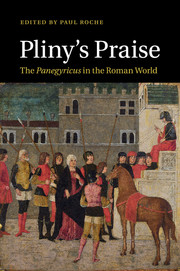Book contents
- Frontmatter
- Contents
- List of contributors
- Preface
- 1 Pliny's thanksgiving: an introduction to the Panegyricus
- 2 Self-fashioning in the Panegyricus
- 3 The Panegyricus and the Monuments of Rome
- 4 The Panegyricus and rhetorical theory
- 5 Ciceronian praise as a step towards Pliny's Panegyricus
- 6 Contemporary contexts
- 7 Politics and the sublime in the Panegyricus
- 8 Down the Pan: historical exemplarity in the Panegyricus
- 9 Afterwords of praise
- Bibliography
- Index locorum
- General index
9 - Afterwords of praise
Published online by Cambridge University Press: 05 June 2011
- Frontmatter
- Contents
- List of contributors
- Preface
- 1 Pliny's thanksgiving: an introduction to the Panegyricus
- 2 Self-fashioning in the Panegyricus
- 3 The Panegyricus and the Monuments of Rome
- 4 The Panegyricus and rhetorical theory
- 5 Ciceronian praise as a step towards Pliny's Panegyricus
- 6 Contemporary contexts
- 7 Politics and the sublime in the Panegyricus
- 8 Down the Pan: historical exemplarity in the Panegyricus
- 9 Afterwords of praise
- Bibliography
- Index locorum
- General index
Summary
Pliny's intention that the oratio (i.e. the written version, Ep. 1.20.9) of his Panegyricus be available to posterity was explicit (Ep. 3.13, 3.18). So if his self-important aspiration that the speech prove directly instructive to future emperors (Ep. 3.18.2–3; Pan. 4.1) was not to be realized, it was not for lack of effort on his behalf, since his conscious attempt to revise and expand the original version and to secure the speech's survival through distribution seems to have been an ambitious and original project. This process of revision and publication was in keeping not only with Pliny's general practice in publishing his oratory, but also perhaps with his long-term commitment to publish his letters. As his own literary agent for his speeches and letters, Pliny was bold and innovative, but if he would have been pleased with the reception of his Panegyricus in later antiquity, it was perhaps not what he would have imagined.
Forty-three years after Pliny's suffect consulship, Fronto was to take similar office, in July and August. In a letter to Marcus Aurelius in early July 143 ce, prompted by a question from the Caesar, Fronto explained that he was postponing delivery of his gratiarum actio to Augustus Antoninus Pius for the consulship until 13 August.
- Type
- Chapter
- Information
- Pliny's PraiseThe Panegyricus in the Roman World, pp. 175 - 188Publisher: Cambridge University PressPrint publication year: 2011
- 3
- Cited by

